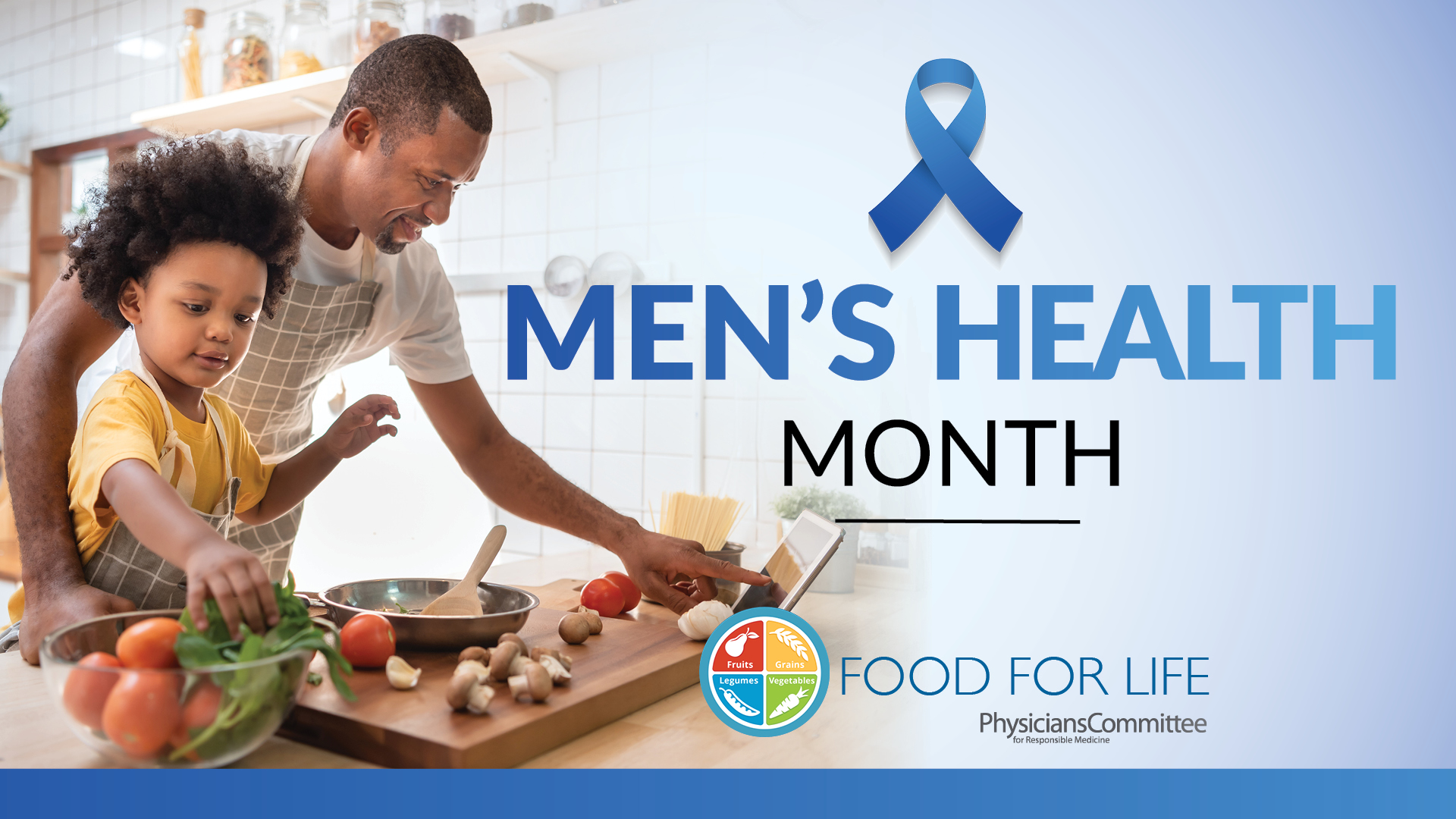Men’s Health Month: Dietitian Answers Men’s Plant-Based Diet Questions

How do I get enough protein? How do I stay plant-based while traveling? Why can’t I just eat what I want and take drugs for high cholesterol? This Men’s Health Month, Physicians Committee Dietitian Noah Praamsma, MS, RDN, has teamed up with Food for Life instructors to answer these and other common questions they get from men about plant-based diets.
Interested in learning more about a plant-based diet for men’s health? Food for Life instructors deliver evidence-based nutrition education and cooking instruction in their communities around the world. To learn more about the program and find a class near you, visit FFLClasses.org.
Q: Why can’t I just take drugs for my blood pressure and cholesterol and eat whatever I want? (Source: Mark Cerkvenik, FFL Instructor from Mokena, Ill.)
A: Health is like a Rubik’s Cube. If you focus on solving just one side, all the others will be just as jumbled as before, and you won’t have completed the puzzle. In the same way, focusing on just a few disease markers by taking medications while ignoring other parts won’t help you reach a state of good health. Additionally, medications for high blood pressure and cholesterol aren’t without side effects, but you shouldn’t stop taking your current medications without talking to your doctor first. By using a food and lifestyle approach, however, effects can benefit more than your blood pressure and cholesterol. You can also improve your weight, insulin sensitivity, cognition, bone health, and so much more. Achieving health in one area shouldn’t mean you have to compromise health in another.
Q: How can I make sure I am getting enough protein? (Source: Matt Dempsey, FFL Instructor from Cheshire, Conn.)
A: Vegans can very easily get enough protein. Let’s start with baseline requirements: The average male needs about 56 grams of protein each day, but the average American consumes nearly 80 grams daily. Many people are often surprised by the wide range of foods containing protein. Protein is found in just about all foods, including plants, and is especially high in legumes and grains. Soy, in particular, is a powerful legume that not only packs a lot of protein but also has many other benefits. By eating a well-balanced diet that includes legumes, grains, fruits, and vegetables at most meals, vegans won’t have an issue getting all the quality protein they need. A study of 71,000 people representing a variety of diets backed this up: It found that vegans easily had adequate protein intake.
The term “well-planned” is often used to describe vegan diets that are abundant in all necessary nutrients. What this refers to are plant-based diets that have variety, provide necessary calories, include a B12 supplement, and are made up of foods from all four food groups.
Q: How can I stay true to a whole food plant-based diet when I am traveling? (Source: Jim Spellos, FFL Instructor from Bayside, N.Y.)
A: Planning is key for maintaining a plant-based diet while traveling. For local or domestic travel, research restaurants ahead of time. When dining with omnivores, it’s usually possible to find restaurants with plant-based menu options. An internet search using the keywords “restaurants with vegan options near me” or “…near ____” may be all you need. If you find yourself in a restaurant without any vegan menu items, think outside the box and look for ingredients on the menu that could be turned into a meal. You could even simply ask for a baked potato and some vegetables cooked without animal fat.
If you’re traveling internationally, the world is your oyster mushroom! Many cultures have vegan-friendly cuisines, including Asian, African, Middle Eastern, Indian, and Latin and South America. Do some research on the area you’re going to and learn about what sort of plant-based foods they have to offer.
For the trip itself, packing your own food is a fantastic habit to get into. It leaves a lot less up to chance. This could look like keeping a supply of fruit, vegetables, or grain- or legume-based snacks at the ready for when hunger hits. Granola bars are a great option. Additionally, many airlines offer vegan meals for longer flights. On a road trip? Remember that you’re in the driver’s seat and can choose where to stop for food.
Finally, if you’re staying with hosts, let them know well in advance that you are plant-based and offer to help with cooking or suggest a few simple recipes or pantry items that would make your stay with them enjoyable. Remember that plants are cheaper than meat, so your request probably won’t cost them much extra money!
Q: Will I have enough energy without meat? (Source: Charles Smith, FFL Instructor from Madison, Miss.)
A: Many people report feeling much better and having more energy after adopting a vegan diet. Studies back this up, too. One study of patients with osteoarthritis found that a whole food, plant-based diet improved their energy levels, and other studies of athletes found a slight benefit of plant-based diets on endurance and strength-based activity.
One of the other reasons vegans tend to have more energy and feel better generally is because of fiber. Fiber does many things. It slows down the rate at which your body absorbs sugar, which keeps your energy levels steady rather than spiking high and then plummeting. Fiber also helps reduce cholesterol and promotes healthy blood flow, which enables oxygen to get to your brain and muscles. It also has been linked to attaining and maintaining a healthy weight, which means you might not get as tired carrying around extra pounds. Finally, it’s beneficial for your digestive system, where good bacteria can have wide-ranging impacts on your cognition and other bodily functions when they are given the fibrous food they need to thrive.
Q: How do I eat plant-based when my friends don’t, especially when we all go out to eat at our favorite steak house? (Source: Joel Erickson, FFL Instructor from St. Paul, Minn.)
A: Even the most meat-centric steak houses probably have something you can eat—like a baked potato, steamed vegetables, or a hearty salad. You can also take a few minutes to study the restaurant’s menu in advance so you can plan for your meal even before you arrive. Another option is to eat a snack ahead of time if you are concerned about the options that may be available. With time, you might find your friends warm up to the idea of trying a different restaurant, such as one with both omnivorous and plant-based choices.













